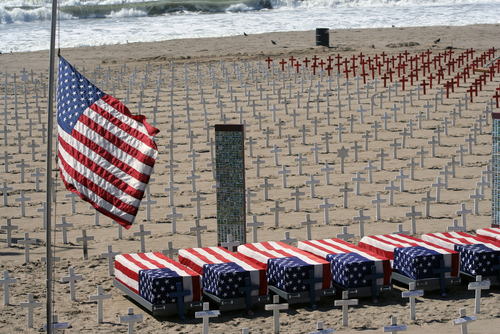Ten years ago this month, the United States invaded Iraq on false pretenses. On December 15, 2011, U.S. Defense Secretary Leon Panetta declared the war officially over.
In the March 16 issue of the medical journal the Lancet, researchers examined the war’s consequences for human health. While politicians argue about the meaning of war, one thing is certain — it’s a public health crisis.
The damage from the Iraq war:
-At least 116,903 Iraqi non-combatants dead.
-More than 4,800 coalition military personnel dead (including 4,409 Americans).
-Minimum of 31,000 U.S. military members injured.
-About 950 military personnel returned home with at least one amputated limb.
–High rates of mental health problems among veterans, including post-traumatic stress disorder, major depression and generalized anxiety.
-Significant psychological distress to children and family members of the deployed.
-An ultimate economic cost of ~$3 trillion.
As astounding as these figures are, they only scratch the surface. No one touched by war is ever the same again. In a recent Washington Post op-ed, Marine Capt. Timothy Kudo explained it like this:
While I don’t know why individual veterans resort to suicide, I can say that the ethical damage of war may be worse than the physical injuries we sustain. To properly wage war, you have to recalibrate your moral compass. Once you return from the battlefield, it is difficult or impossible to repair it.
VA has started calling this problem “moral injury,” but that’s as deceptive a euphemism as “collateral damage.” This isn’t the kind of injury you recover from with rest, physical therapy and pain medication. War makes us killers. We must confront this horror directly if we’re to be honest about the true costs of war.
Were these costs worth it? What did we gain? Ten years after our politicians sent our men and women into war, it’s our duty to ask.
Image by Shutterstock

The always debatable justifications offered by those who believe otherwise include:
– “We got rid of Saddam” (true, but arguably sanctions were never allowed to fully play out)
– “Iraq has a stable, democratic government now” (less stable than Saddam’s, and large constituencies, like women, are still marginalized)
– “The Gulf region is a safer place now” (?? Iraq is now friends with Iran who militarily supports the Syrian government in its awful civil war. Doesn’t sound all that much better.)
No. What benefits there might be seem weak, and not particularly noble, compared to the very dire and very inarguable costs you list.
But are wars ever worth the destruction they impose? Afghanistan? It seems to be that war almost never balances out in favor of the good over the bad, when viewed by hindsight. We undertake it, nevertheless, mostly because big violence is the easy way to solve the big world problems. And then we wrap it up in rationalization: the alternatives just won’t work, they seem too hard or too slow or too cowardly or not gratifying enough. How is it that we forget so quickly lessons like Vietnam, and make ourselves believe that this time, oh yes this time, things will be different and it will all be worth it? Will we do this again in 30 or 40 years?
Probably.
But I live in hope. My 5 year old grandson does not view big violence as a convenient solution. Maybe he never will.